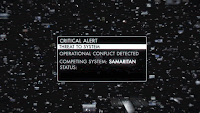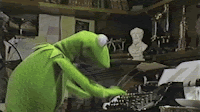I like to start the year with kind of a quick reminder for all of us. How the ranty blog started, what it is, why I’m still doing it.
Easiest first. I more or less started this back in (gasp!) 2007. I was writing for a screenwriting magazine, and by nature of it I’d see tons of articles and websites about “helpful” tricks for networking, getting stuff in front of agents, producers, editors—all the sort of stuff you worry about after writing. I’d guess at least two-thirds of the “writing” articles, even in our own magazine, fell into this category.
Eventually, I tossed them up here just so it felt like I’d done something with them. I thought they were fairly well-written and I didn’t want them to languish on my computer. As I moved further into the full-time writer life, I was exposed to more and more people’s work. I read scripts for a couple different contests, which got me 400+ pages a day of exposure to it. And it struck me that I kept seeing the same basic mistakes being made again and again. So posting here became a regular thing.
It didn’t take long to realize a lot of aspiring writers fall into one of two groups. The first group thinks writing and storytelling are mechanical, quantifiable processes that can be broken down into definitive rules and formulas. They quote pieces from Writers Digest and the MLA Handbook to show why their novel deserves to be published, or point to screenwriting books as proof their script is perfect.
The other group thinks spelling, formatting, and structure just hamper the creative process. People always ignore those things once they see the inherent beauty in the prose, right? Nothing matters past the art flowing out of the writer’s fingertips, and anyone who says otherwise is a sellout who doesn’t understand what writing’s supposed to be about. Don’t know how to spell that word? Don’t know what the word means? Not in the mood to write? Someone said bad things about their writing? Absolutely none of it matters except being happy about their art.
Y’see, Timmy, there are correct and incorrect things in writing. I have to know how to spell (me—not my spellchecker). I have to understand grammar. I need to have a sense of pacing and structure and format. As a writer, I can’t ignore any of these requirements, because these are things I can get wrong and I’ll be judged on them. By editors. By agents. By readers.
On the other hand, there’s no “right” way to develop a character or outline or start my writing day. There’s only the way that’s right for me and my story. Or you and your story. Or her and her story. This is the Golden Rule I’ve mentioned here once or thrice. If we ask twenty different writers about “how to write,” we’re going to get twenty different answers. And allof these answers are valid, because all of these methods work for that writer.
 Again, that still doesn’t mean I can ignore every convention or rule I don’t like. I need to understand the rules if I want to break them successfully. Yeah, maybe there are ten or twenty people I can point at who broke the rules and succeeded. But I need to remember there are thousands, probably millions, of people who broke the rules and failed miserably.
Again, that still doesn’t mean I can ignore every convention or rule I don’t like. I need to understand the rules if I want to break them successfully. Yeah, maybe there are ten or twenty people I can point at who broke the rules and succeeded. But I need to remember there are thousands, probably millions, of people who broke the rules and failed miserably.
And that’s kinda what the ranty blog is about. I talk about writing. Not the after-the-fact-stuff, just…writing. I talk about the rules we all need to learn and follow (until we’ve got the experience to bend or break them). I offer various tips and suggestions I’ve heard over the years that may (or may not) help out when it comes to crafting a story or shaping a character or sharpening some dialogue. If there’s something you’ve been beating your head against that you’d like me to blab about, let me know down in the comments. I’ve been doing this for a long time now—there aren’t many topics I haven’t had a painful learning experience with, and I’m always willing to share.
Which I guess leaves “why.” And that’s pretty simple. Like I said, I’ve made lots and lots of mistakes on my path to “published, semi-successful, quasi-known author.” If I can help some of you get past them—or maybe just not spend so much time splashing around in them—I’d like to do it. I mean, people helped me, I should pass it on. And it’s not like writing is a zero-sum game. Helping you improve your chances doesn’t lessen anybody else’s chances. Really. I can show you the math if you like.
Simply put, I want you to succeed. And I’ll do what I can to help make it happen.
And that’s why I’m posting writing advice here every Thursday, and a bunch of stuff on Tuesdays too.
On a semi related note, I’d also like to recommend the Writers Coffeehouse to you. It’s a monthly meeting of writers of all types and levels to talk about… well, writing. All aspects from first ideas and editing to pitching and marketing. It’s completely free—no obligations or requirements of any kind—it’s kinda fun, and it’s open to everyone. If you’re in the LA area, I host it on the second Sunday of every month (which would be ten days from now) at the wonderful Dark Delicacies bookstore in Burbank. If you’re closer to San Diego, Jonathan Maberry (the guy behind V-Wars and the Joe Ledger books) hosts one on the first Sunday of every month (for example this Sunday) at the Mysterious Galaxy bookstore. And I think at this point there are a dozen others scattered across the country. Boston, San Francisco, Durham NC, Sacramento… I should really dig up the full list. Please check one of them out if you’re in the area.
Next time, I’d like to talk about the process of writing. Your process, actually.











